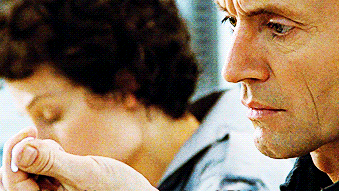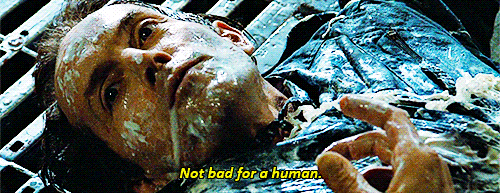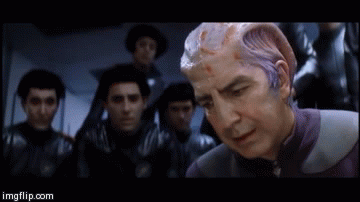Read on and you will never be able to fully lose yourself in a movie again. You will become like Neo in the Matrix, transmogrifying your movie worlds into ones and zeros, the curtain lifted.
via GIPHY
Are you ready? Minor spoilers ahead, but what do they matter? They're in movies you'll no longer be able to lose yourself in, anyway.
Whenever you watch a movie, be on the look out for refusals, like when Neo refuses to jump off a ledge:
Guess what's going to happen in the movie later?
via GIPHY
Maybe the protagonist doesn't like snakes?
via GIPHY
You can count on a snake pit.
via GIPHY
Maybe the protagonist is an actor who HATES the catchphrase that made him rich and famous but makes him feel like a hack?
Or perhaps the protagonist HATES androids?

That protagonist and android are going to save each other's lives.

These are more well known refusals and reversals. But refusals like this INFEST every movie you see. And they are like Chekov's gun: If they're shown in act one, you KNOW they're going off by act three with a reversal.
Why are refusal/reversals so common? Because film ignites our imagination and entrances us with the implied promise that our own lives can change in big ways in a matter of hours. We may be mere baristas today, but by tomorrow, we too may be emperors. The bigger the change in the movie, the more we believe in our emperor destiny. So movies don't show us two people who love each other, and by the end of the movie love each other a little bit more. They flip hate into love, fear into courage, pain into ecstasy.
And how does a visual medium establish the two opposite ends of a spectrum? Not through dialogue! We don't want to just hear someone define the spectrum, we want to see it through action. And that first action is the refusal.
So the next time you watch a movie on TV, have the pause button ready, and every time you see the protagonist refuse something--she won't apologize, he won't get drunk, it won't get on an airplane--stop the movie and ask yourself how they might reverse that refusal. You'll probably be able to predict act three with great accuracy, and from then on will never be able to lose yourself in the medium again.
But on the plus side, you'll see opportunities in your own work to amplify your own characters that you may not have seen before. You're welcome!

No comments:
Post a Comment